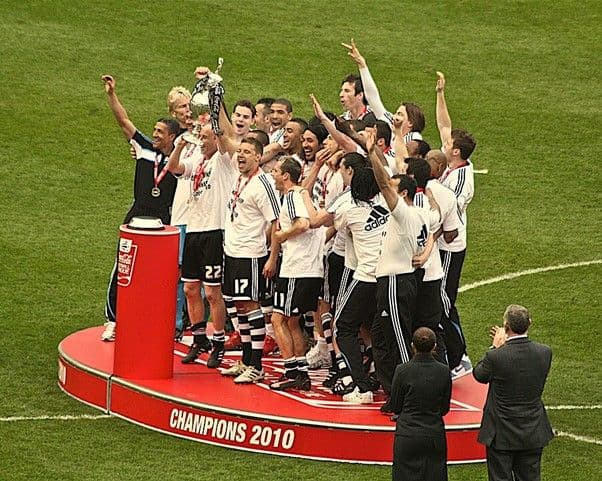Football
Promotion and Relegation Explained: How Many Football Teams Get Promoted From The EFL Championship?
Most football leagues around the world use promotion and relegation, but how many teams are promoted from EFL Championship to the Premier League?

Image Credits: James Cracknell
The English Football League (EFL) Championship, and second-highest division in the professional English football league system.
The Premier League is the top flight football division in the country, and the richest league in the world. One of the founding principles of English sports, football notwithstanding, is promotion and relegation.
Three teams are promoted from the Championship to the Premier League each season. Conversely, the bottom three clubs in the
Championship are relegated to League One. England’s third-highest professional football division. This continues throughout the English football pyramid.
Moreover, the three clubs relegated from the Premier League drop into the Championship, while three teams from League One are admitted into England’s second-highest football league. SportsBoom takes a deep dive into the system of promotion and relegation in professional football: Here is what we learned.

Image Credits: mikebrown59 - Championship Winners 2010
How does promotion and relegation work in the English Football League (EFL)?
Promotion and relegation is when teams move up or drop down between divisions. Leagues are arranged in a hierarchical structure, which based on a team’s performance over a season. The system of promotion and relegation systems is known as open leagues. This system is used in many sports, but in world football, there are exceptions. Promotion and relegation add drama to a season, with the threat of relegation and the hope of promotion.
The Championship, League One, and League Two all have six teams changing between them each season. The Premier League only gains and loses three clubs, as there is no promotion from the top flight league. The best-ranked club(s) in a lower division are promoted to a higher division, while the worst-ranked club(s) in the higher division are relegated to the lower division for the following season.
Teams that are at the top or near the top of the table have a chance to qualify for promotion are said to be in the promotion zone.
Teams near the bottom are in the relegation zone. The colloquially terms for these zones are the “drop zone,” where clubs are “facing the drop.”
There is an alternate system of league organisation; however, this is rarely used. Several countries, primarily in the United States of America, Canada, Australia and Singapore, use a closed league professional association football model. This model is based on franchises and/or licensing.
This model means these pro leagues maintain the same teams from year to year. Often the football teams are not called clubs, they are known as franchises. These leagues only expand or contract with the admission of expansion teams and/or the relocation of existing teams. There is no movement between the major league and minor leagues.

Image Credits: Tim Filbert
How does promotion and relegation work in Europe’s ‘big five’ leagues?
The Premier League consists of 20 football clubs, as does La Liga in Spain. Ligue 1 in France has 18 teams, the Bundesliga, Germany’s top flight football league, has 16 teams. The Championship has 24 clubs participating each season. Six teams enter and exit the English leagues every year. The top Premier League clubs qualify for European competitions.
Many European leagues see the top three teams automatically promoted and the bottom three relegated. Spain’s La Liga uses the EFL system of promotion and relegation. Interestingly, Germany’s top two Bundesliga tiers only have two automatic promotion and relegation places between divisions. A two-legged play-off system is used to determine whether the third club stays up or goes down a division, much like England.
France’s Ligue 1 uses an exciting high-stakes method of determining who is promoted and relegated. A two-legged home and away playoff match takes place, with the last team in the 18-club Ligue 1 playing the top team from Ligue 2, in a winner takes all battle. If the Ligue 1 club wins the tie, they remain in France’s top-tier division. However, should they lose, they are relegated, and the Ligue 2 club is promoted.

Image Credits: Jon Candy
What is the EFL Championship?
The EFL consists of 24 British clubs, known as the Championship in England and Wales, was introduced in 2004/05 as the Football League Championship, which was renamed the Football League First Division. This is also a rebrand of the defunct Football League Second Division prior to the launch of the Premier League in 1992.
The winning club of this division each season receives the EFL Championship trophy, which was the previous trophy awarded to the old First Division champions before the launch of the Premier League. Welsh clubs participate in any division in England, even the Premier League, making these cross-border leagues unique. Welsh clubs can also play in the FA Cup.
For more features, guides, and the latest news in the world of football, stay connected to SportsBoom.com.
FAQs
Which 2023/24 EFL Championship clubs got promoted to the Premier League?
Leicester City, Ipswich Town, and Southampton were all promoted to the Premier League.
Which 2023/24 EFL Championship clubs got relegated to League One?
Birmingham City, Huddersfield Town, and Rotherham United were all relegated from the Championship to League One.
Which 2023/24 Premier League clubs got relegated to the EFL Championship?
Birmingham City, Huddersfield Town, and Rotherham United were all relegated from the Premier League to the Championship.

Kaylan Geekie is a sports fanatic. He attended Durban High School before moving to Scotland, where he lived for 15 years. During his time in the United Kingdom, Kaylan graduated with a first-class BA Honours Degree in Sports Journalism at the University of the West of Scotland. Kaylan worked for nine years as the Match-Day Editor of SuperXV.com, reporting on Super Rugby, The Rugby Championship, the 2015 Men's Rugby World Cup and the 2017 British & Irish Lions series for the website.